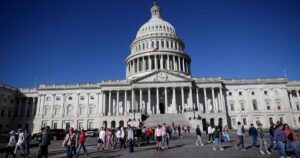Congress
K Street rakes in hundreds of millions off of Trump upheaval
Some of Washington’s biggest lobbying firms raked in unprecedented amounts of cash last quarter. But it’s the upstart firms with ties to President Donald Trump or his administration that have been drowning in lobbying fees, lapping their more established rivals on K Street as Trump’s second term continues to scramble the hierarchy of the influence industry.
Ballard Partners led the charge with more than $25 million in lobbying revenues in the third quarter, shattering the firm’s previous record of $20.7 million the previous quarter. Clients flocked to the firm that once counted White House chief of staff Susie Wiles and Attorney General Pam Bondi as employees.
Ballard’s phenomenal growth — the firm is set to add 5,000 square feet of new office space in the coming weeks, despite previously having moved into larger offices in the last few years — is another indicator of a transformation of lobbying in Trump’s second term. The biggest winners aren’t the massive law and lobbying firms that have pulled together deep benches of bipartisan lobbyists with extensive policy expertise and ties to Blue Light News and party establishment.
Those carefully curated rosters, aimed at insulating firms from the whiplash of transitions in political power, are being supplanted in value by the consolidation of federal authority within the West Wing — and the select group of firms that might be able to get a foot in the door.
“The industry is in an adjustment year as lobbying needs have changed under the Trump administration in a way not normal for a ‘new’ President,” John Raffaelli, a longtime Democratic lobbyist and founder of the lobbying firm Capitol Counsel, wrote in an email.
Ballard is perhaps the biggest winner of all. The firm signed roughly three dozen new clients during the third quarter, including one of Brazil’s top business lobbies, the Swiss watchmaker Breitling, the city of Miami and the Port of Long Beach. It collected six-figure payments from over 80 clients, according to a Blue Light News analysis of disclosures and reported holding three of the most lucrative lobbying contracts on K Street last quarter.
The runner-up last quarter was a decades-old mainstay of the D.C. lobbying world, but one that touts its own ties to the White House.
BGR Group, which employs Trump adviser David Urban and previously employed Transportation Secretary (and acting NASA Chief) Sean Duffy, reported $19.2 million in lobbying revenues in Q3 — up from $17.7 million in Q2 and $11.4 million a year ago.
“Every one of our policy practice areas has got something big going on,” said Loren Monroe, a principal at BGR. He pointed to the firm’s leading health care practice, whose clients include marquee drug lobbies, health systems, pharmaceutical companies, pharmacies, patient groups and providers.
The firm also represents top targets of HHS Secretary Robert F. Kennedy Jr.’s Make America Healthy Again movement, including pesticide companies and giant food conglomerates. It has signed up elite universities whose federal funding has been frozen, crypto firms looking for a light regulatory touch and defense companies seeking business.
BGR leapfrogged two of K Street’s more recent leaders, Brownstein Hyatt Farber Schreck and Akin Gump Strauss Hauer & Feld, which respectively took in $18.9 million and $16.3 million in lobbying revenue last quarter.
Another firm with close ties to the White House, Miller Strategies, jumped into the top five with $14.1 million last quarter, up from $2.9 million a year ago. Miller Strategies is led by Jeff Miller, a top GOP fundraiser who served as one of the finance chairs for Trump’s second inauguration.
When it comes to Trump’s impact on the lobbying industry, the rising tide has lifted most boats.
Brownstein’s third quarter earnings were still a firm record, and while Akin’s numbers were down slightly from the previous quarter, the firm had its best third quarter ever.
Across the top 20 firms by revenue, 14 shops saw their revenue rise by double digit percentages or more, according to the Blue Light News analysis and numbers provided by the firms.
Of the top 20, only Forbes Tate Partners and Capitol Counsel saw their lobbying income decline compared to the same time a year ago — and those decreases were minuscule, coming in at 0.3 percent and 1.4 percent, respectively.
“I think for a traditional bipartisan shop we have managed this well,” said Raffaelli, whose firm reported a 2.3 percent increase in revenues compared to the second quarter.
Another Trump-linked firm that has capitalized is Continental Strategy, which was started in 2021 by former Trump administration official Carlos Trujillo. The firm’s lobbyists include former Trump campaign aides and former top aides to Secretary of State Marco Rubio. Continental reported $8.3 million in lobbying fees in Q3, compared to nearly $400,000 during the same period last year.
A person familiar with the firm’s thinking said that Continental hasn’t needed to do much outbound client prospecting to fuel its boom in business. New business has been driven more by referrals from existing clients, according to the person, who was granted anonymity to discuss business dynamics.
“Our growth isn’t driven by any specific policies or issues — it’s clients seeking us out for our reputation and the talent we have assembled,” Trujillo said in a statement.
Other firms that saw big increases are Checkmate Government Relations, which is led by Trump family friend Ches McDowell; Mercury Public Affairs, a bipartisan shop that’s been in D.C. for over two decades, but which was Wiles’ most recent K Street home before going into the administration; and Michael Best Strategies, which is led by Trump’s first White House chief of staff Reince Priebus.
(For the full third-quarter rankings of lobbying firms, read (and sign up for) POLITICO Influence, our newsletter on all things K Street.)
A tariff lobbying bonanza
The gold rush on K Street comes despite the fact that Trump signed the year’s shining legislative achievement — the reconciliation package permanently extending prized tax cuts, gutting clean energy incentives, slashing funding for safety net programs and unlocking billions of dollars for an immigration enforcement — just four days into the quarter.
The third quarter tends to be sleepier for lobbyists because the city clears out for the August recess. But any concerns about an end-of-summer slump did not come to pass.
“I said to someone the other day that if your lobbyist is telling you that nothing is happening in Washington because of the shutdown or because of gridlock or because of August recess … you are missing the forest for the trees,” Monroe quipped.
Efforts to shape how the megabill is implemented are now underway at the agency level. Beyond that, lobbyists repeatedly cited the frenetic pace of activity in the executive branch — on trade in particular — as one of the top drivers of business last quarter.
Brian Pomper, a partner at Akin, said that Trump’s trade policy “has prompted clients from virtually every industry to seek counsel” from the firm’s roster of trade lobbyists, which includes a top trade official from Trump’s first term along with former House Ways and Means Chair Kevin Brady.
The firm has signed more than two dozen new clients this year to work on trade or tariff issues, disclosures show. They include steel giant Alcoa, Volvo North America, retailers Ralph Lauren and Tiffany & Co., Kimberly-Clark Corporation and Driscoll’s.
Tariffs were mentioned as a specific area of focus in 350 lobbying disclosures last quarter — triple the number of disclosures that listed tariff policy during the third quarter of 2024.
Even though the chaos that marked the initial rollout of Trump’s so-called reciprocal tariffs in the spring has died down somewhat, K Street will be glued to next month’s Supreme Court proceedings to determine whether Trump’s broad tariffs are illegal.
One lobbyist even went so far as to suggest that anxiety surrounding the tariff litigation has exceeded the uncertainty leading up to Trump’s unveiling of the tariffs, dubbed “Liberation Day” by the president.
Not even a government shutdown has managed to dampen lobbying activity.
Though it has snarled efforts to set up meetings for clients across the government, lobbyists are now working to tweak their game plans for convincing lawmakers to use their dwindling floor time to prioritize their clients’ top issues. There’s a whole host of issues vying for that time: appropriations, a defense reauthorization, tax extenders, technical corrections to the reconciliation bill, crypto regulations, health reforms, AI, permitting or another issue entirely.
“We need to look past the shutdown,” said Will Moschella, who co-leads Brownstein’s lobbying practice. “Because that ultimately is going to resolve itself.”
Congress
Senators eye sanctions vote after Trump targets Russian oil
The bipartisan authors of sweeping Russia sanctions legislation are hoping the Senate is finally ready to consider their bill after President Donald Trump hit Moscow’s energy sector with penalties this week.
Sen. Lindsey Graham (R-S.C.), a close Trump ally and coauthor of legislation taking aim at Russian oil and gas revenue, said Congress “should continue the pressure.” He said the Senate could schedule a “Russia week” in which it takes up several bills related to Moscow’s war against Ukraine.
Graham and Sen. Richard Blumenthal (D-Conn.) have been pressing for months for a vote on their measure to implement steep tariffs on countries that import Russian energy and secondary sanctions on foreign companies that aid in its energy production.
“We have the ability to create a sanction regime that would be beyond legal challenge,” Graham told reporters, explaining why congressional action would be prudent beyond Trump’s unilateral moves. He added that “Trump would be the quarterback.”
Majority Leader John Thune said last week he was ready to advance the long-stalled sanctions package, predicting last week the bill will be brought up within a month. But he struck a more cautious note Thursday.
“As you know, I’ve been interested for some time in getting the sanctions bill up on the floor,” he said. “We’re trying to do … that in concert and coordination with the White House to make sure that we’re giving them the best possible opportunity to succeed in getting Russia to the table.”
Separately, Sen. Jim Risch (R-Idaho), chair of the Senate Foreign Relations Committee, called a potential vote on sanctions “a work in progress” Thursday.
Thune and Graham have worked with the White House to smooth over technical issues in the bill, but progress halted last week after Trump spoke to Russian President Vladimir Putin and announced plans for a summit meeting in Hungary.
Those plans have since collapsed, prompting the Treasury Department to sanction Russia’s two largest oil companies Wednesday. Now, advocates for a tougher line against Putin want the Senate to follow up with the Graham-Blumenthal bill, which has more than 80 cosponsors.
“I think it establishes a trajectory for passing our sanctions bill, and there’s no excuse for delay,” Blumenthal said.
Asked if Trump supports the sanctions bill, Thune said as a “general matter, yes,” but added there were things the White House wants incorporated and that “we’re in conversation with them.”
Graham and Blumenthal floated the possibility that other bills could come to the floor, including measures allowing frozen Russian assets to be repurposed for Ukraine’s use and designating Russia as a state sponsor of terrorism. Thune said discussions are underway about votes on those bills.
Minority Leader Chuck Schumer, meanwhile, said off the floor Thursday that the Senate should advance “a strong, tough sanctions bill.”
Calen Razor contributed to this report.
Congress
Obamacare ‘auto-enrollees’ are key target as Republicans formulate tax-credit extension plan
As Republicans formulate a plan to potentially extend key health insurance subsidies that are at the center of the government shutdown fight, House Energy and Commerce Chair Brett Guthrie warned in an interview Tuesday that any extension would “absolutely” need to include a crackdown on so-called “phantom” Obamacare enrollees.
The move is sure to spark a clash with Democrats, who successfully challenged similar provisions from Guthrie’s committees when they were included in the GOP megabill that passed over the summer. But now Republicans have more leverage as Democrats push for the continuation of tax credits that are set to expire Dec. 31.
“If there’s going to be an extension of those tax credits, the program integrity stuff … absolutely needs to be in place,” Guthrie said.
He was referencing a suite of Republican policies that would put new curbs on reenrollment for the enhanced insurance subsidies that are at the core of Democrats’ shutdown demands. Republicans and influential conservative health lobbyists complain the status quo leads to waste, fraud and abuse.
“Once you sign up, you’re on it forever,” Guthrie said.
Democrats argue those complaints aren’t grounded in reality, and the GOP push could set off a larger fight over how Americans enrolled in the program. Many Democrats, especially progressives, are worried about adding new barriers to access coverage, which they argue would disproportionately hit low-income Americans.
When Republicans tried to insert new curbs in their party-line megabill, Senate Democrats successfully challenged the provisions with the chamber’s parliamentarian.
Now House and Senate GOP leaders are making a big push for a crackdown on auto-enrollment as they begin talks among themselves and with White House officials about a possible subsidy extension and other conservative health care policy initiatives.
Senate Majority Leader John Thune in particular frequently references phantom enrollment as one problem Republicans want to tackle. At least some Democrats are open to negotiating on the topic, and there have been quiet, informal conversations in the Senate about that piece specifically.
“I understand what their issue is,” Sen. Mark Kelly (D-Ariz.) said in an interview Thursday. “And if they would work with us and have a real negotiation on how we fix the premiums, I think that is something that we could address.”
Kelly confirmed he’s talked to “several” Republican colleagues about the policy, adding, “I think they have some points.” The other “other side” of the argument, he said, is that “folks that don’t have a lot of means, when you put barriers in front of them, they tend to drop their health insurance.”
Robert King contributed to this report.
Congress
101 Republicans to defend community finance program from Trump cuts
More than 100 Republican lawmakers are expected to sign on to a letter pushing back on the Trump administration’s move to eliminate a popular, bipartisan community development finance fund that helps small businesses and home buyers access capital in areas of the country underserved by big banks.
The congressional Republicans are pressing the Trump administration to reverse its decision to fire all employees at the Treasury Department’s Community Development Financial Institutions Fund, according to the draft letter. The letter is expected to be sent to the administration Thursday.
The bicameral letter, led by Rep. Young Kim (R-Calif.), a member of the House Financial Services Committee, and Sen. Mike Crapo (R-Idaho), who chairs the Senate’s Community Development Finance Caucus, is addressed to Treasury Secretary Scott Bessent and Office of Management Director Russ Vought. The letter “strongly urge[s] the Administration to continue carrying out the statutory obligations of the CDFI Fund that are essential to ensuring private investments reach our states and districts.”
The large wave of GOP lawmakers that signed the letter signals widespread support among congressional Republicans for a program that the Trump administration has attempted to eviscerate.
The list of signatories obtained by Blue Light News includes 27 Senators and 74 House members. The letter was signed by key Republicans, including Sens. Tim Scott (R-S.C), Lisa Murkowski (R-Alaska), Susan Collins (R-Maine), Thom Tillis (R-N.C.), Chuck Grassley (R-Iowa), Mike Rounds (R-S.D.) and Reps. Bill Huizenga (R-Mich.), Mike Lawler (R-N.Y.) Mike Flood (R-Neb.), and Andrew Garbarino (R-N.Y.), among others.
The CDFI Fund awards federal dollars to CDFIs, which are community banks, credit unions and other financial institutions, that lend and provide other types of capital as part of a public-private partnership designed to increase the accessibility for communities traditionally underserved by the banking industry.
-
Uncategorized11 months ago
Bob Good to step down as Freedom Caucus chair this week
-

 Politics8 months ago
Politics8 months agoFormer ‘Squad’ members launching ‘Bowman and Bush’ YouTube show
-

 The Josh Fourrier Show12 months ago
The Josh Fourrier Show12 months agoDOOMSDAY: Trump won, now what?
-

 The Dictatorship8 months ago
The Dictatorship8 months agoPete Hegseth’s tenure at the Pentagon goes from bad to worse
-

 Politics8 months ago
Politics8 months agoBlue Light News’s Editorial Director Ryan Hutchins speaks at Blue Light News’s 2025 Governors Summit
-

 The Dictatorship8 months ago
The Dictatorship8 months agoLuigi Mangione acknowledges public support in first official statement since arrest
-

 Politics12 months ago
Politics12 months agoWhat 7 political experts will be watching at Tuesday’s debate
-

 Politics8 months ago
Politics8 months agoFormer Kentucky AG Daniel Cameron launches Senate bid




